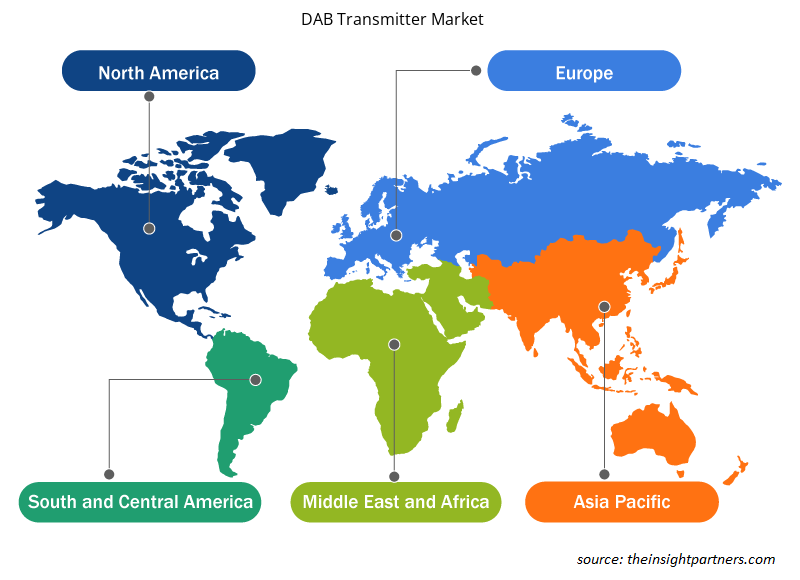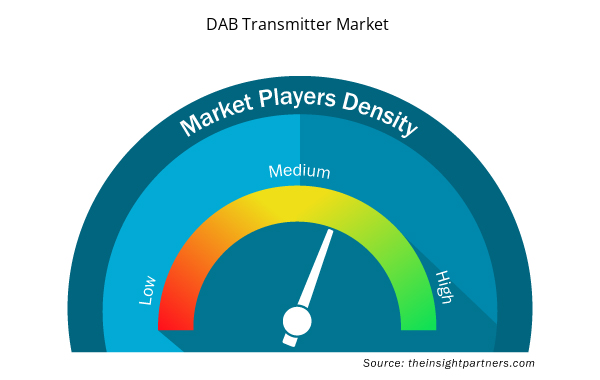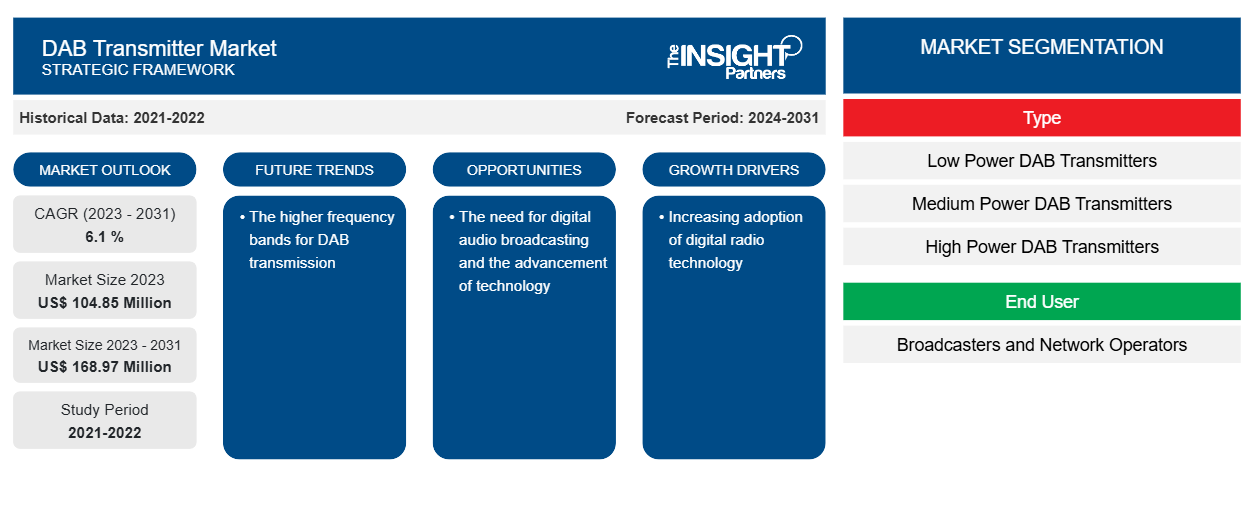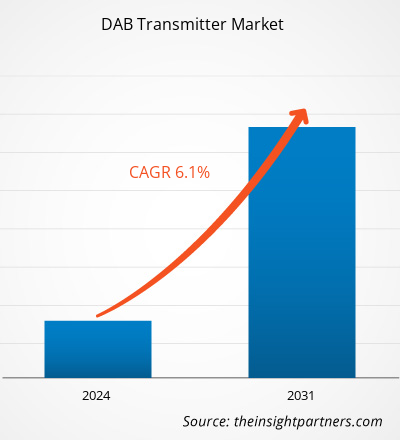من المتوقع أن يصل سوق أجهزة إرسال البث الرقمي إلى 168.97 مليون دولار أمريكي بحلول عام 2031 من 104.85 مليون دولار أمريكي في عام 2023. ومن المتوقع أن يسجل السوق معدل نمو سنوي مركب بنسبة 6.1٪ خلال الفترة 2023-2031. ومن المرجح أن تظل نطاقات التردد الأعلى لنقل البث الرقمي اتجاهًا رئيسيًا في السوق.
تحليل سوق أجهزة إرسال البث الرقمي
إن سوق أجهزة إرسال البث الرقمي العالمية مدفوع بشكل أساسي بالاعتماد المتزايد على الطائرات بدون طيار في مجموعة متنوعة من التطبيقات مثل المسح ورسم الخرائط والمراقبة. بالإضافة إلى ذلك، فإن العدد المتزايد من الشركات الناشئة يدفع توسع سوق أجهزة إرسال البث الرقمي على مستوى العالم. بالإضافة إلى ذلك، مع راديو البث الرقمي، يمكن للمستخدمين استقبال جميع محطات الراديو ، ولم يعد المستخدمون يعتمدون على الاستقبال. وبالتالي، من المتوقع أن تولد الحاجة إلى البث الصوتي الرقمي والتقدم التكنولوجي فرصًا مربحة لنمو السوق خلال الفترة المتوقعة.
نظرة عامة على سوق أجهزة إرسال البث الرقمي
تتيح تقنية البث الصوتي الرقمي (DAB) للمذيعين إرسال خدمات الصوت والبيانات الرقمية عالية الجودة إلى أجهزة الاستقبال المتنقلة والثابتة في نطاقات التردد العالي جدًا (VHF) مع تسهيل مشاركة محطات الراديو المتعددة في تكاليف الإرسال من خلال البث على نفس التردد باستخدام جهاز إرسال واحد. DAB هو إصدار مطور من جهاز إرسال DAB، والذي يوفر جودة صوت أفضل واستخدامًا أكثر كفاءة للطيف للخدمات الإضافية واستقبالًا أكثر قوة.
قم بتخصيص هذا التقرير ليناسب متطلباتك
ستحصل على تخصيص لأي تقرير - مجانًا - بما في ذلك أجزاء من هذا التقرير، أو تحليل على مستوى الدولة، وحزمة بيانات Excel، بالإضافة إلى الاستفادة من العروض والخصومات الرائعة للشركات الناشئة والجامعات
- احصل على أهم اتجاهات السوق الرئيسية لهذا التقرير.ستتضمن هذه العينة المجانية تحليلاً للبيانات، بدءًا من اتجاهات السوق وحتى التقديرات والتوقعات.
محركات وفرص سوق أجهزة إرسال البث الرقمي
تزايد اعتماد تكنولوجيا الراديو الرقمية
يستخدم DAB ترددات أعلى من FM، وبالتالي، قد تكون هناك حاجة للتعويض عن طريق المزيد من أجهزة الإرسال لتحقيق نفس التغطية مثل جهاز إرسال FM واحد. عادةً ما تنقل شركة مختلفة DAB من المذيع، الذي يبيع بعد ذلك السعة إلى عدد من محطات الراديو. يمكن أيضًا استخدام موالف DAB كمكبر صوت Bluetooth وراديو منبه. باستخدام راديو DAB، يمكن للمستخدمين استقبال جميع محطات الراديو، ولم يعد المستخدمون يعتمدون على الاستقبال. تتحول العديد من محطات الراديو الحديثة أيضًا إلى DAB. لذلك لم يعد بإمكانهم استقبالها عبر راديو FM.
الحاجة إلى البث الصوتي الرقمي والتقدم التكنولوجي
إن الحاجة إلى الصوت الرقمي عالي الجودة آخذة في الازدياد، حيث يمكن لنظام البث الرقمي الصوتي توفير مجموعة من خدمات البيانات، بما في ذلك جداول البث اليومية التفصيلية، وعروض الشرائح المرئية، وتحديثات المرور الحاسمة، والتي تشمل معلومات حول أحداث المرور، ومواقف السيارات، والنقل العام، والمركبات الكهربائية. كما تتزايد الحاجة إلى التكنولوجيا المتقدمة. يتم استخدام تقنيات مختلفة في استخدام أجهزة إرسال البث الرقمي الصوتي، مثل دمج أحدث تكنولوجيا مجمع الترددات الراديوية، وموازنة الأحمال الوهمية، وواجهة الاتصال الذكي بين وحدات الترددات الراديوية، وبرامج التشغيل، ونظام التحكم المنطقي. وبالتالي، من المتوقع أن تولد الحاجة إلى البث الصوتي الرقمي والتقدم التكنولوجي فرصًا مربحة لنمو السوق خلال الفترة المتوقعة.
تقرير تحليل تجزئة سوق أجهزة إرسال البث الرقمي
إن القطاعات الرئيسية التي ساهمت في اشتقاق تحليل سوق جهاز إرسال DAB هي النوع والمستخدم النهائي.
- وفقًا للنوع، يتم تقسيم سوق أجهزة إرسال DAB إلى أجهزة إرسال DAB منخفضة الطاقة وأجهزة إرسال DAB متوسطة الطاقة وأجهزة إرسال DAB عالية الطاقة. احتلت شريحة الرباعية الصغيرة حصة سوقية أكبر في عام 2023.
- بحسب المستخدم النهائي، يتم تقسيم السوق إلى شركات البث ومشغلي الشبكات.
تحليل حصة سوق أجهزة إرسال البث الرقمي حسب المنطقة الجغرافية
ينقسم النطاق الجغرافي لتقرير سوق جهاز إرسال DAB بشكل أساسي إلى خمس مناطق: أمريكا الشمالية، ومنطقة آسيا والمحيط الهادئ، وأوروبا، والشرق الأوسط وأفريقيا، وأمريكا الجنوبية والوسطى.
تهيمن أمريكا الشمالية على سوق أجهزة إرسال البث الرقمي. يتيح الإعلان الصوتي الرقمي للمعلنين في أمريكا الشمالية الوصول إلى قنوات الإعلان الصوتي الرقمي في جميع أنحاء المنطقة. يمكن للشركات في الولايات المتحدة وكندا الحصول على تغطية إعلانية وطنية والاستفادة من تنسيق الإعلان الأصلي من خلال البث الصوتي. ومن المتوقع أن تساعد هذه الاستثمارات والتمويل مزودي أجهزة إرسال البث الرقمي على توسيع أعمالهم وتوفير الحلول للمستخدمين النهائيين من مختلف القطاعات. يعمل الطلب المتزايد على الطائرات بدون طيار على دفع الصوت الرقمي في أمريكا الشمالية، وهو ما من المرجح أن يفيد سوق أجهزة إرسال البث الرقمي في المنطقة.
رؤى إقليمية حول سوق أجهزة إرسال البث الرقمي
لقد قام المحللون في Insight Partners بشرح الاتجاهات والعوامل الإقليمية المؤثرة على سوق أجهزة إرسال DAB طوال فترة التوقعات بشكل شامل. يناقش هذا القسم أيضًا قطاعات سوق أجهزة إرسال DAB والجغرافيا في جميع أنحاء أمريكا الشمالية وأوروبا ومنطقة آسيا والمحيط الهادئ والشرق الأوسط وأفريقيا وأمريكا الجنوبية والوسطى.

- احصل على البيانات الإقليمية المحددة لسوق أجهزة إرسال DAB
نطاق تقرير سوق أجهزة إرسال البث الرقمي
| سمة التقرير | تفاصيل |
|---|---|
| حجم السوق في عام 2023 | 104.85 مليون دولار أمريكي |
| حجم السوق بحلول عام 2031 | 168.97 مليون دولار أمريكي |
| معدل النمو السنوي المركب العالمي (2023 - 2031) | 6.1% |
| البيانات التاريخية | 2021-2022 |
| فترة التنبؤ | 2024-2031 |
| القطاعات المغطاة | حسب النوع
|
| المناطق والدول المغطاة | أمريكا الشمالية
|
| قادة السوق وملفات تعريف الشركات الرئيسية |
|
كثافة اللاعبين في سوق أجهزة إرسال البث الرقمي: فهم تأثيرها على ديناميكيات الأعمال
يشهد سوق أجهزة إرسال البث الرقمي نموًا سريعًا، مدفوعًا بالطلب المتزايد من المستخدم النهائي بسبب عوامل مثل تفضيلات المستهلك المتطورة والتقدم التكنولوجي والوعي المتزايد بفوائد المنتج. ومع ارتفاع الطلب، تعمل الشركات على توسيع عروضها والابتكار لتلبية احتياجات المستهلكين والاستفادة من الاتجاهات الناشئة، مما يؤدي إلى زيادة نمو السوق.
تشير كثافة اللاعبين في السوق إلى توزيع الشركات أو المؤسسات العاملة في سوق أو صناعة معينة. وهي تشير إلى عدد المنافسين (اللاعبين في السوق) الموجودين في مساحة سوق معينة نسبة إلى حجمها أو قيمتها السوقية الإجمالية.
الشركات الرئيسية العاملة في سوق أجهزة إرسال DAB هي:
- شركة الكترولينك المحدودة
- شركة إيلينوس المحدودة
- معدات البث الإذاعي وأجهزة الإرسال من شركة Eletec
- شركة إلتي دو
- جيتساير
- شركة.
إخلاء المسؤولية : الشركات المذكورة أعلاه ليست مرتبة بأي ترتيب معين.

- احصل على نظرة عامة على أهم اللاعبين الرئيسيين في سوق أجهزة إرسال DAB
أخبار سوق أجهزة إرسال البث الرقمي والتطورات الأخيرة
يتم تقييم سوق أجهزة إرسال البث الرقمي من خلال جمع البيانات النوعية والكمية بعد البحث الأولي والثانوي، والتي تتضمن منشورات الشركات المهمة وبيانات الجمعيات وقواعد البيانات. فيما يلي بعض التطورات في سوق أجهزة إرسال البث الرقمي:
- تتمتع خدمة البث الإذاعي الرقمي DAB+ بتغطية أفضل في Spiš. أطلقت Towercom جهاز إرسال جديد آخر هذا الشهر، وهو Rudnik، الواقع بالقرب من نفق Branisko. تم الإطلاق بعد أيام قليلة من الحصول على الترخيص. بناءً على الترخيص الصادر، يوزع جهاز الإرسال على القناة 5C بأقصى طاقة مسموح بها تبلغ 1 كيلو وات في الاستقطاب الرأسي. هذا هو جهاز الإرسال DAB+ الثالث الذي تم إطلاقه هذا الشهر. (المصدر: Towercom، بيان صحفي، يوليو 2023.)
- احتفلت شركة Muxnet UK، التي تعمل مع هيئات البث المحلية والمجموعات المجتمعية لمساعدتها في إطلاق مجمعات البث الرقمي على نطاق صغير، بإطلاق المجمع الخمسين من خلال الإشارة إلى الوتيرة السريعة لنشر البث الرقمي على نطاق صغير على مدار العامين الماضيين. (المصدر: Muxnet UK، بيان صحفي، مارس 2024)
تقرير سوق أجهزة إرسال البث الرقمي (DAB) والتغطية والنتائج المتوقعة
يوفر تقرير "حجم سوق جهاز إرسال DAB والتوقعات (2021-2031)" تحليلاً مفصلاً للسوق يغطي المجالات التالية:
- حجم سوق أجهزة إرسال DAB والتوقعات على المستويات العالمية والإقليمية والوطنية لجميع قطاعات السوق الرئيسية التي يغطيها النطاق
- اتجاهات سوق أجهزة إرسال DAB بالإضافة إلى ديناميكيات السوق مثل المحركات والقيود والفرص الرئيسية
- تحليل مفصل لقوى PEST/Porter الخمس وSWOT
- تحليل سوق أجهزة إرسال DAB يغطي اتجاهات السوق الرئيسية والإطار العالمي والإقليمي والجهات الفاعلة الرئيسية واللوائح والتطورات الأخيرة في السوق
- تحليل المشهد الصناعي والمنافسة الذي يغطي تركيز السوق، وتحليل خريطة الحرارة، واللاعبين البارزين، والتطورات الأخيرة في سوق أجهزة إرسال DAB
- ملفات تعريف الشركة التفصيلية
- التحليل التاريخي (سنتان)، السنة الأساسية، التوقعات (7 سنوات) مع معدل النمو السنوي المركب
- تحليل PEST و SWOT
- حجم السوق والقيمة / الحجم - عالميًا وإقليميًا وقطريًا
- الصناعة والمنافسة
- مجموعة بيانات Excel



Report Coverage
Revenue forecast, Company Analysis, Industry landscape, Growth factors, and Trends

Segment Covered
This text is related
to segments covered.

Regional Scope
North America, Europe, Asia Pacific, Middle East & Africa, South & Central America

Country Scope
This text is related
to country scope.
الأسئلة الشائعة
The expected CAGR of the global DAB transmitter market is 6.1 %.
The global DAB transmitter market is expected to reach US$ 168.97 million by 2031.
The higher frequency bands for DAB transmission are anticipated to play a significant role in the global DAB transmitter market in the coming years.
The key players holding majority shares in the global DAB transmitter market are Electrolink S.R.L., Elenos S.R.L., Eletec Radio Broadcasting Equipment and Transmitters, Elti D.O.O., Gatesair, Inc., RFE Broadcast, Rohde And Schwarz., Screen Future S.R.L., SyES S.r.l., and Unique Broadband Systems A Dol Technologies Inc.
Increasing adoption of digital radio technology, The need for digital audio broadcasting, and the advancement of technology are the major factors that propel the global DAB transmitter market.
North America dominates the DAB transmitter market.
Trends and growth analysis reports related to Electronics and Semiconductor : READ MORE..
The Insight Partners performs research in 4 major stages: Data Collection & Secondary Research, Primary Research, Data Analysis and Data Triangulation & Final Review.
- Data Collection and Secondary Research:
As a market research and consulting firm operating from a decade, we have published and advised several client across the globe. First step for any study will start with an assessment of currently available data and insights from existing reports. Further, historical and current market information is collected from Investor Presentations, Annual Reports, SEC Filings, etc., and other information related to company’s performance and market positioning are gathered from Paid Databases (Factiva, Hoovers, and Reuters) and various other publications available in public domain.
Several associations trade associates, technical forums, institutes, societies and organization are accessed to gain technical as well as market related insights through their publications such as research papers, blogs and press releases related to the studies are referred to get cues about the market. Further, white papers, journals, magazines, and other news articles published in last 3 years are scrutinized and analyzed to understand the current market trends.
- Primary Research:
The primarily interview analysis comprise of data obtained from industry participants interview and answers to survey questions gathered by in-house primary team.
For primary research, interviews are conducted with industry experts/CEOs/Marketing Managers/VPs/Subject Matter Experts from both demand and supply side to get a 360-degree view of the market. The primary team conducts several interviews based on the complexity of the markets to understand the various market trends and dynamics which makes research more credible and precise.
A typical research interview fulfils the following functions:
- Provides first-hand information on the market size, market trends, growth trends, competitive landscape, and outlook
- Validates and strengthens in-house secondary research findings
- Develops the analysis team’s expertise and market understanding
Primary research involves email interactions and telephone interviews for each market, category, segment, and sub-segment across geographies. The participants who typically take part in such a process include, but are not limited to:
- Industry participants: VPs, business development managers, market intelligence managers and national sales managers
- Outside experts: Valuation experts, research analysts and key opinion leaders specializing in the electronics and semiconductor industry.
Below is the breakup of our primary respondents by company, designation, and region:

Once we receive the confirmation from primary research sources or primary respondents, we finalize the base year market estimation and forecast the data as per the macroeconomic and microeconomic factors assessed during data collection.
- Data Analysis:
Once data is validated through both secondary as well as primary respondents, we finalize the market estimations by hypothesis formulation and factor analysis at regional and country level.
- Macro-Economic Factor Analysis:
We analyse macroeconomic indicators such the gross domestic product (GDP), increase in the demand for goods and services across industries, technological advancement, regional economic growth, governmental policies, the influence of COVID-19, PEST analysis, and other aspects. This analysis aids in setting benchmarks for various nations/regions and approximating market splits. Additionally, the general trend of the aforementioned components aid in determining the market's development possibilities.
- Country Level Data:
Various factors that are especially aligned to the country are taken into account to determine the market size for a certain area and country, including the presence of vendors, such as headquarters and offices, the country's GDP, demand patterns, and industry growth. To comprehend the market dynamics for the nation, a number of growth variables, inhibitors, application areas, and current market trends are researched. The aforementioned elements aid in determining the country's overall market's growth potential.
- Company Profile:
The “Table of Contents” is formulated by listing and analyzing more than 25 - 30 companies operating in the market ecosystem across geographies. However, we profile only 10 companies as a standard practice in our syndicate reports. These 10 companies comprise leading, emerging, and regional players. Nonetheless, our analysis is not restricted to the 10 listed companies, we also analyze other companies present in the market to develop a holistic view and understand the prevailing trends. The “Company Profiles” section in the report covers key facts, business description, products & services, financial information, SWOT analysis, and key developments. The financial information presented is extracted from the annual reports and official documents of the publicly listed companies. Upon collecting the information for the sections of respective companies, we verify them via various primary sources and then compile the data in respective company profiles. The company level information helps us in deriving the base number as well as in forecasting the market size.
- Developing Base Number:
Aggregation of sales statistics (2020-2022) and macro-economic factor, and other secondary and primary research insights are utilized to arrive at base number and related market shares for 2022. The data gaps are identified in this step and relevant market data is analyzed, collected from paid primary interviews or databases. On finalizing the base year market size, forecasts are developed on the basis of macro-economic, industry and market growth factors and company level analysis.
- Data Triangulation and Final Review:
The market findings and base year market size calculations are validated from supply as well as demand side. Demand side validations are based on macro-economic factor analysis and benchmarks for respective regions and countries. In case of supply side validations, revenues of major companies are estimated (in case not available) based on industry benchmark, approximate number of employees, product portfolio, and primary interviews revenues are gathered. Further revenue from target product/service segment is assessed to avoid overshooting of market statistics. In case of heavy deviations between supply and demand side values, all thes steps are repeated to achieve synchronization.
We follow an iterative model, wherein we share our research findings with Subject Matter Experts (SME’s) and Key Opinion Leaders (KOLs) until consensus view of the market is not formulated – this model negates any drastic deviation in the opinions of experts. Only validated and universally acceptable research findings are quoted in our reports.
We have important check points that we use to validate our research findings – which we call – data triangulation, where we validate the information, we generate from secondary sources with primary interviews and then we re-validate with our internal data bases and Subject matter experts. This comprehensive model enables us to deliver high quality, reliable data in shortest possible time.


 احصل على عينة مجانية لهذا التقرير
احصل على عينة مجانية لهذا التقرير